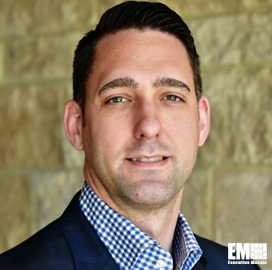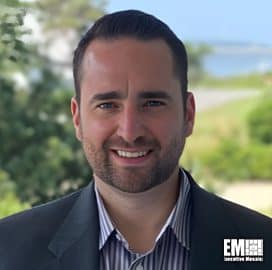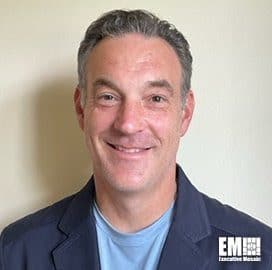
Bryan Walter
VP & GM, Federal
Gordian
Member Profile: Bryan Walter, VP & GM for Federal Solutions at Gordian
Bryan Walter, vice president and general manager of Gordian’s federal solutions business, recently spoke with the Potomac Officers Club about his work supporting the public sector, his advice for breaking into the government contracting industry and his strategy for building a winning team. Prior to joining Gordian, Walter spent time at consulting firms like Accenture, Booz Allen Hamilton and Deloitte.
What can you tell us about your background and how you’ve been able to adapt to the ever-changing challenges of the federal landscape over the course of your career?
“I started out in consulting almost from day one, and I quickly found that I loved solving problems by connecting federal missions to technology solutions. I spent much of my career in the Intelligence Community supporting a variety of missions, particularly around data sharing and cloud computing. The federal landscape has become much more accepting of technology and different ways of buying over the course of my career, and it’s been exciting to evolve with it. The best way I’ve found to evolve is to spend time understanding the mission and bringing forward solutions – both technology and process – that help solve those mission problems, whether it be migrating to the cloud, or protecting sensitive data, or estimating facilities costs to enable accurate forecasting and minimize budget overruns.
In my leadership role at Gordian, I help ensure that these and other mission-critical solutions are integrated into our software tools, so federal agencies and military branches can utilize their facilities as assets to their missions, rather than limitations on them. Our goal is to anticipate challenges to our federal partners on both an individual and global level, so we can accommodate their needs and create a smooth onramp to new operations.”
How would you describe your management style and core values towards building a winning culture?
“The biggest part of culture to me is the people. And to have the best people, you must make an explicit effort to do the right thing for each person in their life and career. It’s critical that you create an environment where every person can be challenged, heard, respected and able to make work fit around their life. I think it’s important not only to find the ‘smartest’ or ‘best’ person for a role, but to seek out the people who want to grow in their careers and bring diversity of thought to the team. Then, I can give them the opportunity to thrive, trust them to succeed at the things they do well and create opportunities for growth. My role is to be there to help solve problems, help them grow and get better at the things they want to improve upon, as well as help identify any blind spots they may have.
I’ve often said to my teams over the years, ‘Make progress every day.’ That’s something that was interesting to me as I joined Gordian and our parent company, Fortive. Fortive has a business system that is all about continuous improvement, with nine core values as the foundation for how we get there. It starts with the customer’s needs and creating solutions that matter to them and then delivering on those solutions day in and day out. To get there, we need to be innovative, we need to be adaptable, we need to be courageous and we need to trust one another to do our part of the work. Doing all of those things, we make progress every day and continuously improve our results for our customers.”
How would you advise someone entering our industry to build their resume and advance their careers to be in the best position in the years to come?
“As I grew in my career, I always struggled with deciding whether to be broad or deep. I knew I wanted to lead a business, so I would need to have depth in certain leadership areas, but I regularly wondered, ‘Do I need to be more technical?’ or ‘Should I be diving deeper into this problem with the team, even though I know they have it under control?’ For me, having breadth allowed me to understand the business and be able to jump in and help solve a lot of different challenges both for clients and for the company. And I loved that kind of problem solving, so I stuck to it, and I think it has served me well. Overall, resume building is going to be a mix of breadth and depth, and what really should drive where you go to best position yourself is to follow the things that interest you most. It’s also important to realize you may not achieve everything you want to in every role and that’s okay – you probably learn more in those roles. That’s where having a strong network of mentors that can lift you up is really important. Mentors can rely on their own experiences to help you see all the angles of how to have the most impact doing those things that interest you.
At Gordian, I’ve seen the opportunity we provide our people to get that breadth of experience while going deep in the areas that are of great interest to them. The flexibility of our model to allow people to try new things and get that diversity of experience is really exciting. Additionally, as an operating company of Fortive, our people often have opportunities to take on roles in other operating companies – and we are able to recruit from within the Fortive talent pool as well. This model allows us to retain our talent while giving our team members that opportunity to build their resume and advance their careers without looking for a new job.”
With emerging technology influencing the federal government and industry more by the day, what are some of the challenges on the business side of innovation that aren’t always discussed as often as they should be?
“It’s easy to look at emerging technologies and think that there’s a solution for every problem. More often than not, though, the technology is engineered to function around a well-oiled process – and that’s where the business or mission side of innovation often falls short. For example, if you look at how federal migrates to the cloud, there has certainly been a significant volume of compute and data workloads moved to the cloud. But are those migrations governed by a cloud management office? Are they following agency cloud guidelines? Are they efficiently using resources and running optimally for cost and performance? I think it’s true that in many cases, the answers to these questions are ‘no,’ which means that the agency may not be realizing the full benefit of the cloud or other emerging technology they’re implementing.
That’s just one example, but it could be applied to any area of technology. At Gordian, we provide services, data and tools to support the federal building lifecycle. For our customers that have a robust facilities management program in place, we can help conduct facilities condition assessments, use that information to drive facilities capital planning and ultimately execute a Job Order Contracting program to oversee contractors performing the maintenance, repair and other activities in a cost effective and time efficient way – all underpinned by our industry standard RSMeans cost estimating data. But it’s rare that the organization or agency is aligned, and the processes are in place, to support a full lifecycle and take best advantage of the tools.
So, I think the biggest challenge is the shortfall in development of the business or mission processes to utilize emerging technologies to their fullest potential. Rather than seeing a single need and finding a single solution to meet that need, it’s better to look at how an entire system of coordinated and connected solutions can bring even greater efficiencies to existing processes, even if that requires overhauling or replacing them.”

Category: Executive Profiles




